Best Big Data Tools
Best big data tools are Pentaho, RapidMiner, MongoDB, KNIME, and intelligent Data Platform. This software enables organizations to extract information from numerous data clusters easily.



No Cost Personal Advisor
List of 20 Best Big Data Tools
Empower all types of users to access and process d
Oracle Analytics Cloud is a comprehensive analytics solution for business users, data engineers, and data scientists. The software has the latest data analytics technology and provides trustworthy insights that assist in making prompt and accurate decisions by addressing the entire data and analytics process. Oracle Analytics Cloud, big data software, allows data ingestion, modeling, enrichment, visualization, collaboration, and more. Learn more about Oracle Analytics Cloud
Explore various Oracle Analytics Cloud features, compare the pricing plans, and unlock the potential of seamless operations by selecting the right software for your business.
- Data Mapping
- Data Capture
- AI / Machine Learning
- Online Analytical Processing (OLAP)
- Data Classification
- Data Matching
- Ad Hoc Reports
- Data Mining
Oracle Analytics Cloud Caters to
- StartUps
- SMBs
- Agencies
- Enterprises
No-code, bi-directional data pipeline platform spe
Hevo is a popular zero-maintenance big data software. It helps businesses set up data pipelines in minutes and automatically syncs all your sources to the data warehouse. Its intuitive code UI enables you to integrate a plethora of sources in real time and lets you analyze data with models and workflows. Learn more about Hevo
Explore various Hevo features, compare the pricing plans, and unlock the potential of seamless operations by selecting the right software for your business.
Features
View all Hevo Features- Data Replication
- Data Integrity
- Data Retrieval
- Data Migration
- Monitoring
- Queries
- Metadata
- Performance Analysis
Pricing
FREE
$ 0
Includes 1 Million Events
STARTER
$ 149
Includes 1O Million Events
Hevo Caters to
- StartUps
- SMBs
- Agencies
- Enterprises
Software by The Apache Software
Apache Hadoop is a powerful big data tool library that enables the distributed processing of vast datasets across computer clusters using straightforward programming models. Its architecture is built to seamlessly expand from individual servers to thousands of machines, with each machine contributing local computation and storage capabilities. Learn more about Apache Hadoop
Explore various Apache Hadoop features, compare the pricing plans, and unlock the potential of seamless operations by selecting the right software for your business.
Features
View all Apache Hadoop Features- Master Data Management
- Collaboration
- Machine Learning
- Data Extraction
- Data filtering
- Data Security
- Roles Management
- Process Management
Apache Hadoop Caters to
- StartUps
- SMBs
- Agencies
- Enterprises
Software by The Apache Software
Apache Spark is one of the best versatile big data tools supporting data engineering, data science, and machine learning tasks on single-node machines and clusters. It seamlessly integrates with popular frameworks, empowering them to scale efficiently across thousands of machines. Learn more about Apache Spark
Explore various Apache Spark features, compare the pricing plans, and unlock the potential of seamless operations by selecting the right software for your business.
Features
View all Apache Spark Features- Regression Analysis
- Data filtering
- Machine Learning
- Document Filtering
- Predictive Modeling
- Content Management
- Data Analysis
- Dashboard
Apache Spark Caters to
- StartUps
- SMBs
- Agencies
- Enterprises
Emergents | 2024
Software by Instaclustr
Instaclustr Apache Kafka is a powerful, reliable, and scalable big tooling software for streaming and queuing always-on applications. The software offers in-built core features such as data transport, data aggregation, and data storage. Instaclustr Apache Kafka is fault-tolerant and can seamlessly handle high-velocity and high-volume data. Learn more about Instaclustr Apache Kafka
Explore various Instaclustr Apache Kafka features, compare the pricing plans, and unlock the potential of seamless operations by selecting the right software for your business.
- High Volume Processing
Instaclustr Apache Kafka Caters to
- StartUps
- SMBs
- Agencies
- Enterprises
Software by The Apache Software
Apache Storm is a distributed real-time big data software that is freely available and open source. It provides a seamless solution for processing unlimited data streams with utmost reliability, revolutionizing real-time processing in a similar manner to how Hadoop transformed batch processing. Learn more about Apache Storm
Explore various Apache Storm features, compare the pricing plans, and unlock the potential of seamless operations by selecting the right software for your business.
Features
View all Apache Storm Features- Process Management
- Data Security
- Data filtering
- Metadata Management
- Predictive Analytics
- Data Analysis
- Data Discovery
- Data Blends
Apache Storm Caters to
- StartUps
- SMBs
- Agencies
- Enterprises
Software by The Apache Software
CouchDB offers highly-developed big data software tools that enable you to access your data wherever you need it. The software helps collect and analyze data for information, business, machine learning, predictive modeling, browsers, and other purposes. CouchDB comes with an easy query language that facilitates easy data retrieval. Learn more about CouchDB
Explore various CouchDB features, compare the pricing plans, and unlock the potential of seamless operations by selecting the right software for your business.
CouchDB Caters to
- StartUps
- SMBs
- Agencies
- Enterprises
Transform raw business data to refined insights.
Zoho Analytics is the best big data software that helps businesses gain in-depth business insights. This simple and effective software lets you analyze massive data easily, even in a highly robust environment. Zoho Analytics enables you to connect multiple data sources like business applications, files and feeds, offline and cloud databases, and cloud drives. Read Zoho Analytics Reviews
Explore various Zoho Analytics features, compare the pricing plans, and unlock the potential of seamless operations by selecting the right software for your business.
Features
View all Zoho Analytics Features- Ad Hoc Reports
- Performance Management
- Report writers
- Self Service Data Preparation
- Data Governance
- Data Visualization
- Data Blending
- Performance Metrics
Pricing
Free
$ 0
Per Month
Basic
$ 17
Per Month
Standard
$ 33
Per Month
Zoho Analytics Caters to
- StartUps
- SMBs
- Agencies
- Enterprises
Emergents | 2024
Big data analytics software for all enterprises
Cloudera is one of the top big data platforms that helps you confidently tackle your toughest challenges. Its open and scalable architecture is designed to modernize your data stack while providing speed, efficiency, and security. Cloudera works across multi-cloud and on-premises environments with great flexibility and cost-effectiveness. Learn more about Cloudera
Explore various Cloudera features, compare the pricing plans, and unlock the potential of seamless operations by selecting the right software for your business.
Cloudera Caters to
- StartUps
- SMBs
- Agencies
- Enterprises
Emergents | 2024
Big data analytics software for data professionals
RapidMiner is a top-rank software in the best big data tools list. It eliminates the complexity of data science and makes machine learning easier by creating predictive models for you. With RapidMiner, you can easily handle big data clusters and run data prep and ETL directly into them without writing any code. Learn more about RapidMiner
Explore various RapidMiner features, compare the pricing plans, and unlock the potential of seamless operations by selecting the right software for your business.
Features
View all RapidMiner Features- Machine Learning
- Predictive Modeling
- Data Visualization
RapidMiner Caters to
- StartUps
- SMBs
- Agencies
- Enterprises
Human-like scraping without IP blocks
Oxylabs utilizes the power of web intelligence to collect data at scale. It provides big data tools driven by AI that can extract data block-free from even the most challenging targets. On top of that, Oxylabs provides multiple language support and can be effortlessly integrated with your scraping infrastructure. Read Oxylabs Reviews
Explore various Oxylabs features, compare the pricing plans, and unlock the potential of seamless operations by selecting the right software for your business.
Features
View all Oxylabs Features- Analytics
- Fraud detection
- Templates
- Predictive Modeling
- Statistical Analysis
- Roles Management
- Data Blends
- Dashboard Creation
Oxylabs Caters to
- StartUps
- SMBs
- Agencies
- Enterprises
Software by ATLAS.ti
ATLAS.ti runs on an AI-driven assistance model fuelled by the popular GPT model. Its big data tools and technologies provide qualitative insights to complete your research projects 10x faster than usual. ATLAS.ti enables you to focus on refinement and analysis for optimized scientific accuracy by saving time on manual processes with its fully automated code proposals. Learn more about ATLAS.ti
Explore various ATLAS.ti features, compare the pricing plans, and unlock the potential of seamless operations by selecting the right software for your business.
ATLAS.ti Caters to
- StartUps
- SMBs
- Agencies
- Enterprises
An intelligent, end-to-end marketing data analytic
Adverity is the perfect big data management software for organizations with complex and massive data sets. The software handles structured, unstructured, and semi-structured data, allowing the users to analyze and interpret it in a simple way. Adverity is an automated solution that helps save resources wasted on monitoring, fixing, and cleaning data. Learn more about Adverity
Explore various Adverity features, compare the pricing plans, and unlock the potential of seamless operations by selecting the right software for your business.
Features
View all Adverity Features- Data Matching
- Dashboard
- KPIs
- Data Quality Control
- Data Mining
- Analytics
- Data Visualization
- Data Analysis
Adverity Caters to
- StartUps
- SMBs
- Agencies
- Enterprises
Dataddo is a no-code data integration platform.
Dataddo is a terrific data integration platform for data engineers, data scientists, finance officers, business owners, BI specialists, sales reps, and marketers. The software carries best-in-class big data tools that equip these professionals with the valuable insights they need to make smart, data-informed decisions. Learn more about Dataddo
Explore various Dataddo features, compare the pricing plans, and unlock the potential of seamless operations by selecting the right software for your business.
Features
View all Dataddo Features- Disparate Data Collection
- Web Data Extraction
- Filtered Views
- Data Format Translation
- Data Blends
- Email Marketing
- Ad hoc Analysis
- Duplicate Detection
Pricing
Free
$ 0
Forever
Data to Dashboards
$ 99
Per Month
Data Anywhere
$ 99
Per Month
Dataddo Caters to
- StartUps
- SMBs
- Agencies
- Enterprises
Emergents | 2024
Big data analytics software for data scientists
KNIME is a highly scalable and flexible big data software that lets you analyze and interpret data without coding. This complete data science platform empowers all business and domain experts, data experts, and other professionals to efficiently work with large data sets with its advanced analytics tools that provide instant insights. Learn more about KNIME Analytics
Explore various KNIME Analytics features, compare the pricing plans, and unlock the potential of seamless operations by selecting the right software for your business.
Features
View all KNIME Analytics Features- AI / Machine Learning
- Data Blending
KNIME Analytics Caters to
- StartUps
- SMBs
- Agencies
- Enterprises
Software by Datawrapper
Datawrapper is a modern data tooling software that lets you convert your data into beautiful charts, maps, or tables in a few clicks. The software is specially designed for professionals from media, finance, government, non-profit, etc., to help them enrich their stories by incorporating interactive data presentation elements. Furthermore, Datawrapper does not require any coding or design skills. Learn more about Datawrapper
Explore various Datawrapper features, compare the pricing plans, and unlock the potential of seamless operations by selecting the right software for your business.
Features
View all Datawrapper Features- Simulation Models
Datawrapper Caters to
- StartUps
- SMBs
- Agencies
- Enterprises
Category Champions | 2024
Big data software for startups and government agencies
MongoDB is an industry-leading big data software for unlocking the potential and revenue of your data. MongoDB lets you create data pipelines in minutes, making handling large data volumes easier. It provides a comprehensive set of big data software tools that collectively helps meet an organization’s end-to-end data needs. Read MongoDB Reviews
Explore various MongoDB features, compare the pricing plans, and unlock the potential of seamless operations by selecting the right software for your business.
MongoDB Caters to
- StartUps
- SMBs
- Agencies
- Enterprises
The easiest way to get real business insights
Sisense is the best big data software for designing high-engagement experiences by incorporating AI and embedded insights. The software uncovers powerful insights by allowing you to connect, analyze, explore, and collaborate with or without code. With Sisense, you can leverage full customization from the look and feel of the front end and deep monitoring around the back end. Read Sisense Reviews
Explore various Sisense features, compare the pricing plans, and unlock the potential of seamless operations by selecting the right software for your business.
Features
View all Sisense Features- Data Analysis
- Ad hoc Analysis
- Ad Hoc Reports
- transform and load (ETL)
- Performance Metrics
- Extract
- Trend / Problem Indicators
- Dashboard
Sisense Caters to
- StartUps
- SMBs
- Agencies
- Enterprises
Software by Xplenty Data Integration
Xplenty is a no-code data pipeline platform for simplifying your entire data journey. The software provides modern big data tools and technologies that help data teams and business users easily build and manage clean, secure data pipelines that drive better decision-making. Learn more about Xplenty
Explore various Xplenty features, compare the pricing plans, and unlock the potential of seamless operations by selecting the right software for your business.
Features
View all Xplenty Features- ETL - Extract / Transfer / Load
- Dashboard
- Metadata Management
- Web Services
- Multiple Data Sources
Xplenty Caters to
- StartUps
- SMBs
- Agencies
- Enterprises
Category Champions | 2024
Big data visualization tools for all businesses
Pentaho is a powerful software that helps you onboard, prepare, and activate data more efficiently than ever. Its robust big data management tools facilitate cloud data integration and help you seamlessly build, deploy, and analyze all data. Pentaho is highly secure, scalable, and flexible and is preferred by analytic and data science experts across the globe. Read Pentaho Reviews
Explore various Pentaho features, compare the pricing plans, and unlock the potential of seamless operations by selecting the right software for your business.
Features
View all Pentaho Features- Predictive Analytics
- Performance Management
- Online Analytical Processing (OLAP)
- Dashboard
- Data Analysis
- Key Performance Indicators
- Trend / Problem Indicators
- Profitability Analysis
Pentaho Caters to
- StartUps
- SMBs
- Agencies
- Enterprises
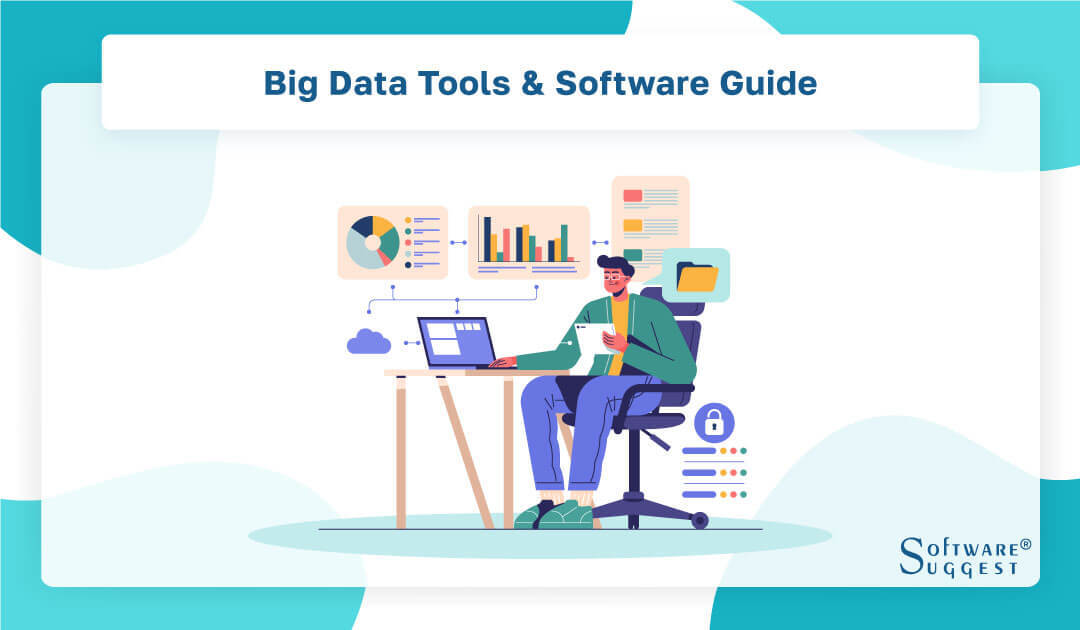
What Are Big Data Tools?
Big data tools extract large volumes of information and data from various sources and utilize algorithms to analyze this data meaningfully. Big data software is a methodology capable of handling large amounts of data and generating better insight. Big data technologies allow businesses to respond with speed and agility, enhancing operational efficiency and customer service.
Big data is a large volume of information that cannot be handled by the more traditional databases or methods of analyzing the data and getting better insight. A data storage system that can store a large data set is commonly known as a big data tool.
How Do Big Data Tools Work?
The role of big data tools is to analyze a large set of data that is near to impossible to analyze and process for insights. Big data analytics refers to collecting, processing, and analyzing data from a large data set and cleaning it for fast and better operational usage.
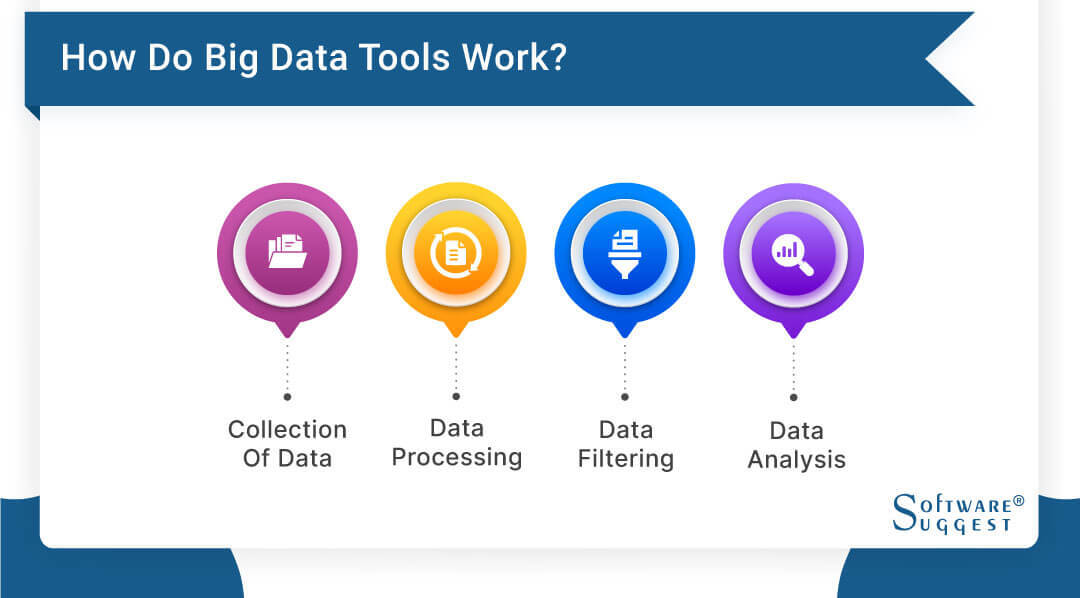
What we receive after this is an organized set of data that can be easily processed using the big data software available from the marketplace. The process we’re going to discuss is performed in a layered approach:
-
Collection Of Data
Big data platforms enable organizations to gather and mine data stores and collect both structured and unstructured data from several locations on a distributed network. Business intelligence tools can be used to access stored data.
-
Data Processing
After collecting and processing big data using various big data tools used, it needs to be organized adequately for better processing and to generate accurate results. Once the data gets larger in size, a batch processing approach is established to perform the task. However, there is yet to be a turnaround time for that.
-
Data Filtering
Cleaning the data is necessary to improve the data flow and generate better insights by removing duplicates, misconfigurations, and corruptions in the data.
-
Data Analysis
The accurate data is then deeply analyzed on selected parameters to provide meaningful insights. Many organizations use advanced big data tools to gain real-time business intelligence and increase operational efficiency.
Benefits of Best Big Data Software
It doesn’t matter if a business holds big data. It has to be utilized to find better insights and productivity. It is in the company’s hands how they will discover accurate data that identifies the market demand for products and services. This also helps identify potential customers and retain existing ones.
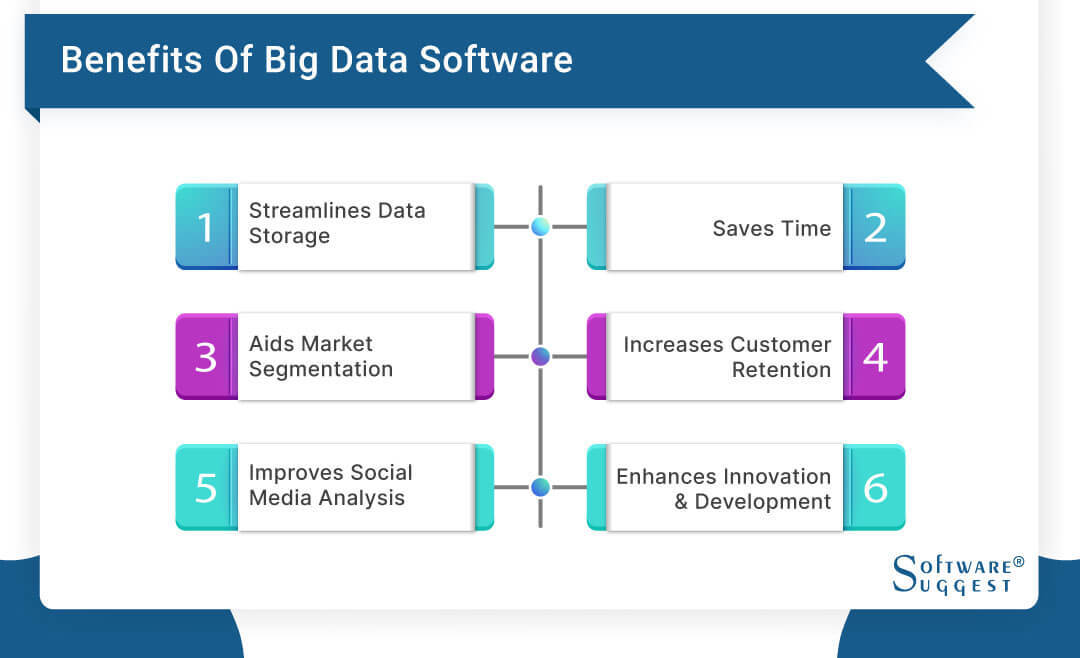
A custom AI development company must need the help of big data to generate better AI-powered services. Big data plays a vital role in artificial intelligence because AI can only be playable with the data only and react to machine learning processes.
There are many variants of the best big data software available in the market. Some key advantages of big data software include the following:
-
Streamlines Data Storage
Big data tools help store a large set of data easily and in a uniform place. It saves money for businesses and helps discover new solutions over storing huge amounts of data.
-
Saves Time
Time-saving is a key metric for any business, and big data software helps to achieve this goal. This metric helps the system collect data streams from different sources and perform analytics in real-time to generate fast decisions.
-
Aids Market Segmentation
Big data can help businesses segment the market. It can help to analyze market trends and identify how customers behave. Big data management tools also suggest what products and services are in demand. With the top big data platforms, businesses can follow market guidelines and develop more products that are highly in demand.
-
Increases Customer Retention
Maintaining your existing customers is more important than finding new ones. Big data ip tools can help forecast customers' behavior and market trends. Big data tools and technologies establish a great approach to maintaining customers and finding new ways to attain more customers.
-
Improves Social Media Analysis
Big data tools watch over social media platforms. Big data software tools can identify the customer's preferences, behavior, and activities. This will help the system to discover the users' and customers' interests and sentiments.
-
Enhances Innovation & Development
Big data tooling can help businesses find better insights into the products and services in demand. Big data management solutions helps businesses to focus on products that are in demand more. Investing in the best big data software can help companies with business research, innovation, and product development.
Features of Best Big Data Software
Big data tools have changed the meaning of businesses. Since the arrival of big data management solutions, companies have been able to harness large volumes of information for better productivity and deep research.
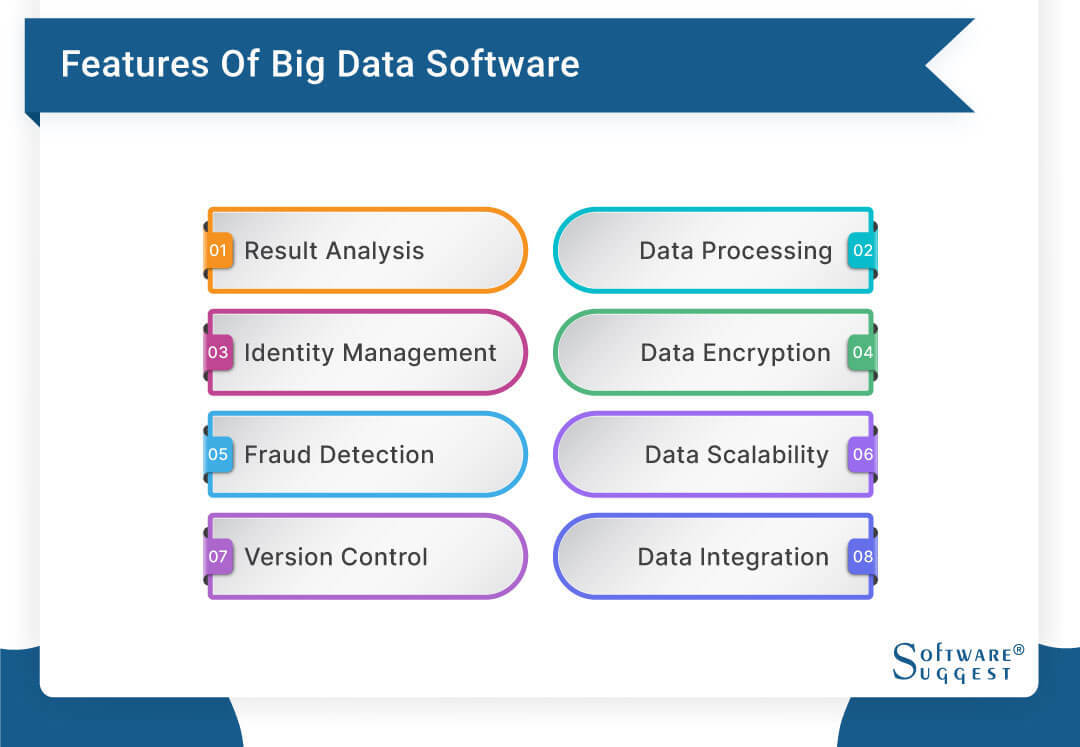
Top big data platforms have plenty of features, and new big data management tools are evolving every day to bring more features that are essential for the industry. Some important features of the best big data tools are as follows:
-
Result Analysis
Results analysis of data aid in establishing new business goals, targets, and strategies. The big data model benefits from the in-depth result analysis. Big data tools and technologies help in real-time data processing, providing useful insights for corrective measures.
-
Data Processing
Collecting data from different sources and effectively organizing them in the system can be easily achieved by big data platforms, commonly known as big data processing tools.
Big data software tools can collect data from various platforms like Microsoft Excel, Microsoft Access, Doc Files, and image applications. Big data tools reduce the data conversion rate and increase the data processing time.
-
Identity Management
Identity management is an important feature of big data platforms. Big data tooling makes it possible to go through each node in the system and collect all the data. It also manages to identify the data, secure it, and take care of the protocols and network encryption in the system.
-
Data Encryption
The safety and security of the data is the key element for any successful business, and the best big data software platforms ensure data safety. Single-Sign-On (SSO) feature is embedded in the software, allowing users to sign in for a single time and access their accounts and activities. Data encryption is enabled by the big data tool that encrypts the data from any external usage using several algorithms.
-
Fraud Detection
Fraud detection involves various layers of fraud analysis that help identify suspicious activities in the system. Big data tooling helps businesses to deal with fraud instead of only identifying them. Fraud detection can be analyzed by the data analysis tools that help the system to ensure it is safe and secure.
-
Data Scalability
One of the biggest advantages of big data tools and technologies is scalability. It can be rapidly scaled up depending on your business requirements and help businesses expand in a structured and streamlined manner. In addition, big data management tools provide insights-driven statistics to the system that can be useful for businesses in many ways.
-
Version Control
Version control is a big data software feature that helps manage compatibility between the two versions of the data handling process. So, when a new version arrives, the data tool integrates and converts the data to meet the new standards.
-
Data Integration
Data integration is a process that combines information from various sources. Big data tooling enables organizations to manage seamless data integration to save time and enhance workflows. If multiple data sources are integrated without modification in the data structure, it improves the data quality, lowers the system cost, and frees up unused resources.
How to Choose The Best Big Data Tools and Technologies?
Choosing the right big data tools and technologies can be daunting due to the numerous options available. Different businesses have different sets of data transactions. It requires careful consideration of various factors to make an informed decision.
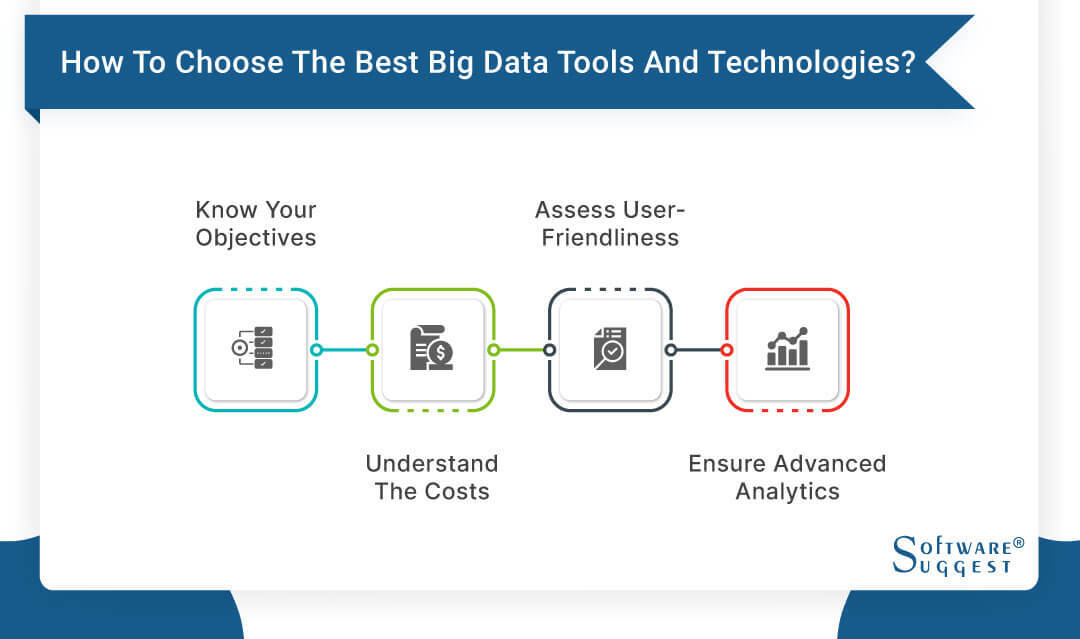
Let’s discuss how to choose the best big data tools and technologies for your business needs.
-
Know Your Objectives
Developing an objective for your business can help you find adequate big data platforms. Knowing your business goals and meeting the current and future business demands is necessary. The objectives of the business can be broken down for a better predictive analysis that helps you meet analytics goals for your business.
-
Understand The Costs
A thorough understanding of all costs, including monthly/yearly charges, maintenance charges, extra data charges, and membership charges, must be considered before you finalize.
-
Assess User-Friendliness
A big data tool that does not require coding skills or technical knowledge would be great to deploy in your business. A friendly environment and a GUI interface make it look more attractive.
-
Ensure Advanced Analytics
The selected big data ip tool must meet the business objectives and goals by discovering patterns and forecasting future requirements. It runs through the in-built algorithm that helps identify the data calculations to generate relevant insights from the business.
Top 9 Big Data Tools Comparison
|
Name
|
Free Trial
|
Demo
|
Starting Price
|
|---|---|---|---|
| Yes (14 days) |
Yes (Upon request) |
Contact vendor | |
|
Yes (14 days) |
Yes (Upon request) | Contact vendor | |
|
Yes (14 days) |
Yes (Upon request) |
$99/month | |
| Free |
No |
Free | |
|
Free |
Yes (Upon request) |
Contact vendor | |
| Free |
No |
Free | |
| Free |
Yes |
$4,995/year | |
| Yes (14 days) |
Yes |
$29/month | |
| Free |
Yes |
$0.44/hour |
Big data tools have revolutionized the way businesses manage and analyze data. Check out the top ten big data tools list along with their pricing, features, pros and cons to choose the best one for your organization.
1. Integrate.io
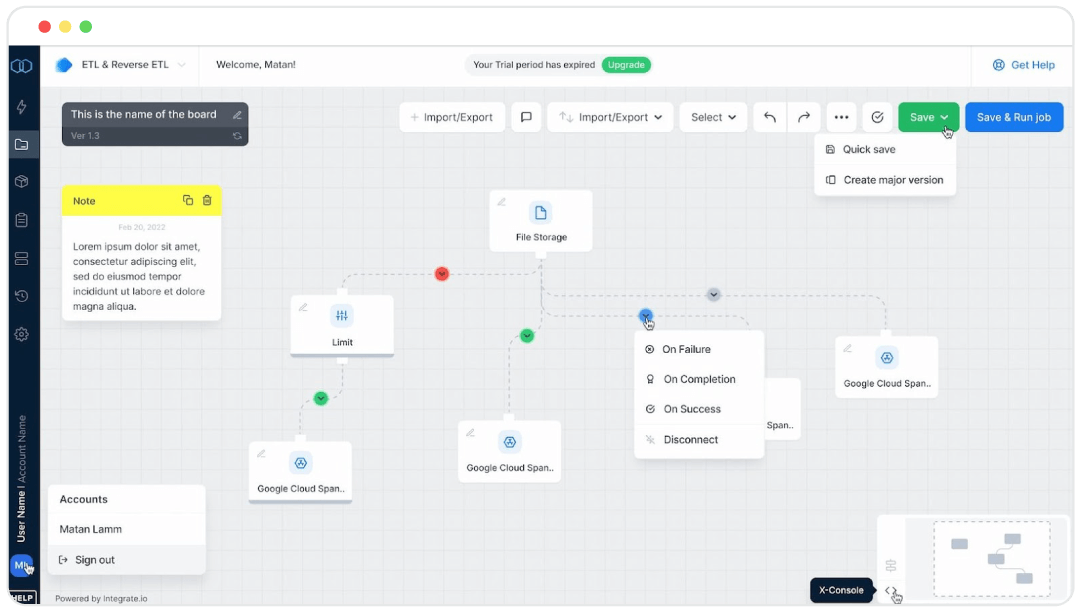
Integrate.io is a big data platform that uses cloud-approach to integrate, collect, and process the data for data analytics. This platform collects all the data from various sources, binds them together, and implements the data to make a duplicate copy of it.
This platform requires minimal coding and provides sales data analytics, support, and marketing solutions. Its key feature is maximizing data utilization without any investment. The platform offers dedicated customer support through various channels such as email, phone, chat, and online meetings.
- Transferable data warehouse
- Data-driven decisions
- Customer 360 views
- 200+ data integration
- Secure ETL leverage
- Cloud-based server
- Scalable data support
- Complex data transformation
- Customizable API
- Instant data access
-
1-year minimum subscription
Pricing
- The free trial option is available for 7 days.
- No plans are explained.
2. Adverity
Adverity is an enhanced platform that helps track performance and flawlessly provides new and better real-time insights streaming data. One of its features integrates data from over 600 different resources and provides artificial intelligence-based data analysis.
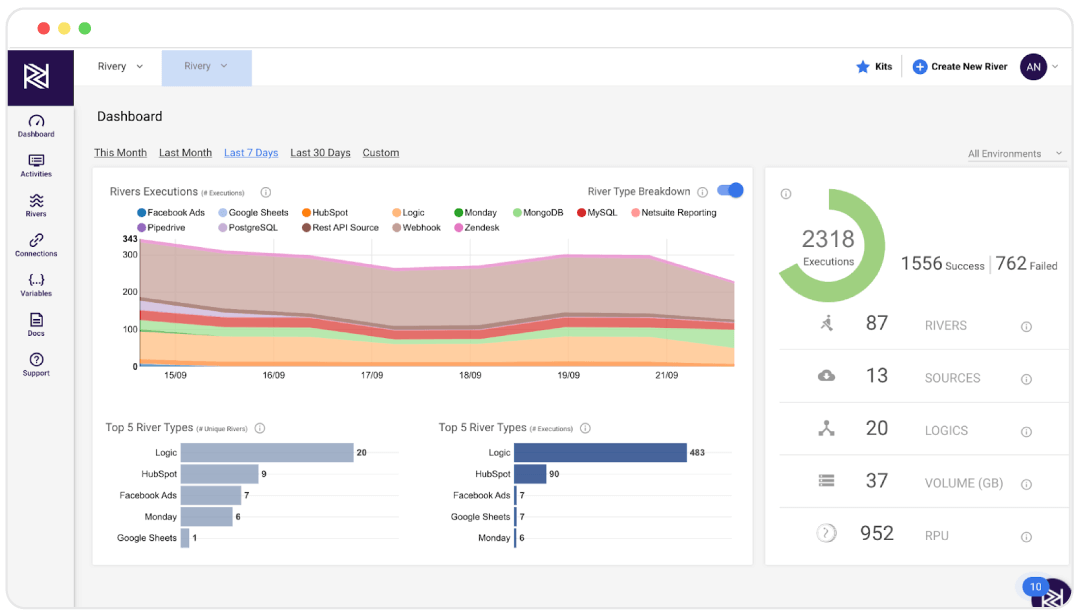
It delivers performance statistics and details data insights upon requisition. It also provides result-driven analysis, which empowers data scientists with insights and predictable ROI for certain big data products and services.
- Proactive analytics
- Automated integration
- Wide data destinations
- ISMS data protection
- Pipeline automation tools
- Built-in analysis tools
- High-end security
- Customizable reporting
- Data transformation handling
- 24/7 customer support
- Flexible data support
- 600+ data sources
- Optimize campaigns
-
Only subscription model, no trial
Pricing
- 14-day no-commitment free trial available
- Subscription-based models are available
3. Dataddo
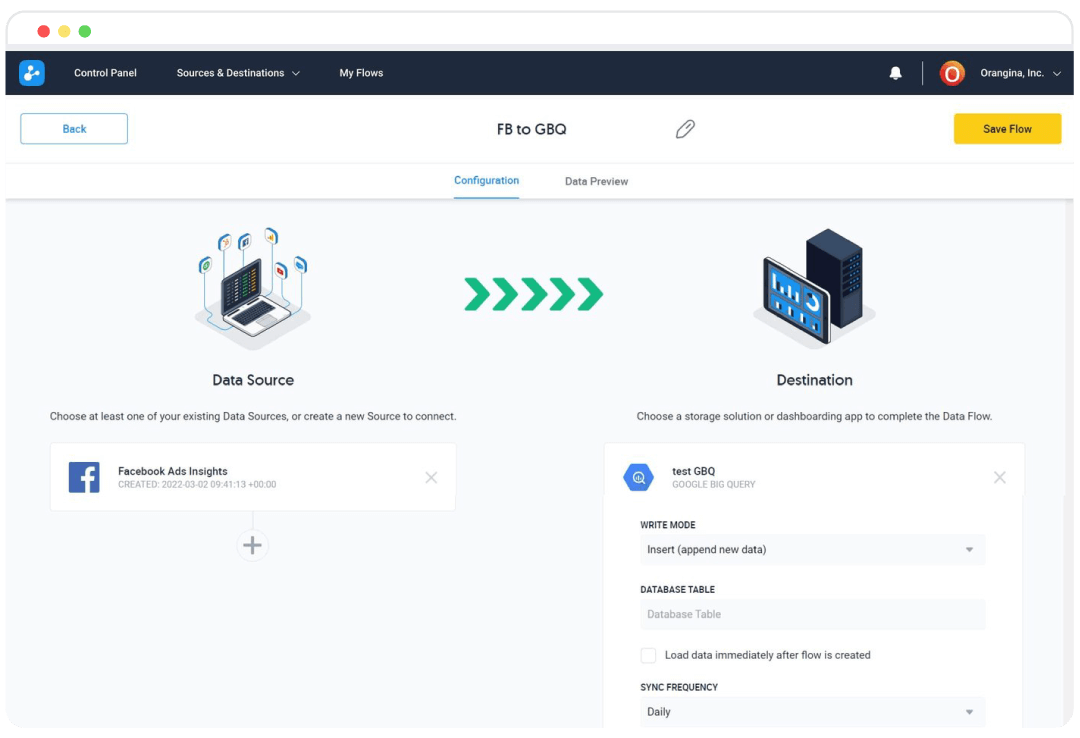
Dataddo is a cloud-based, no-coding-required big data solution that provides flexibility over a wide range of connectors it has. It has several connectors that provide the ability to find the metrics. It can be easily set up in a completely different system architecture and focus on data integration. Dataddo can be easily plugged-in into your existing data stack.
- Unified integration
- API change handling
- Headless integration
- Proactive pipeline monitoring
- 200+ pre-built connectors
- No data warehouse needed
- Simple interface
- On-demand pipeline creation
- No technical skills needed
- No maintenance required
- Infinitely scalable
-
No trial pack is available.
Pricing
- 14 days trial offer with a guaranteed return.
- Monthly and customizable packages are available.
4. Apache Hadoop
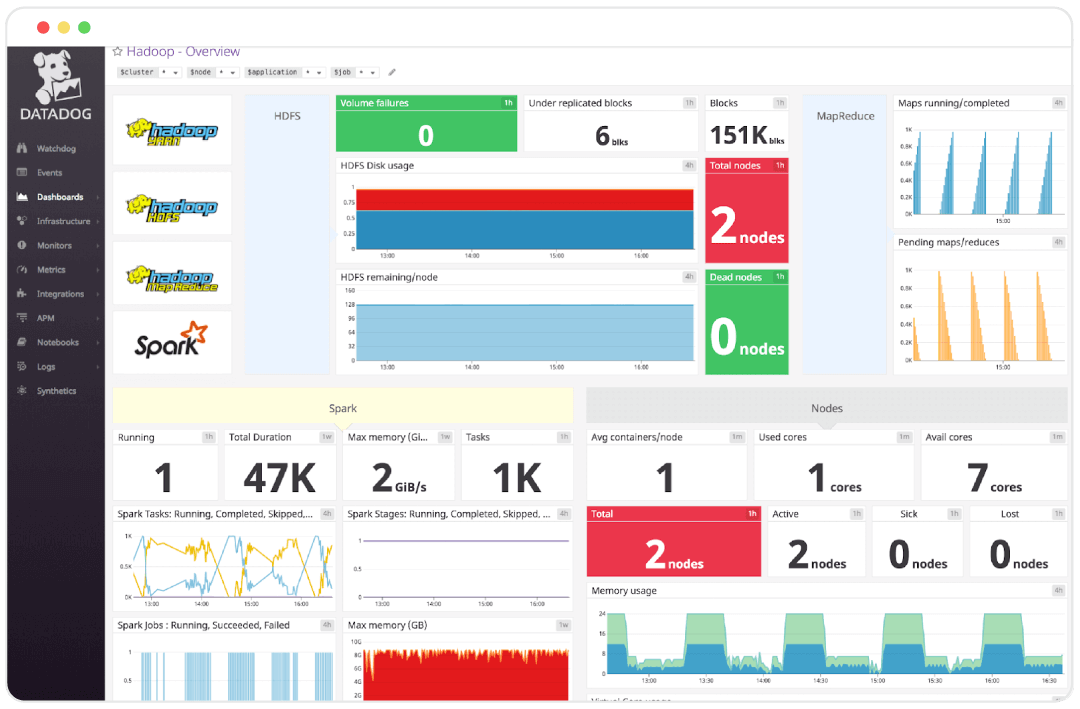
Apache Hadoop is a big data tool that uses a simple program to create an architecture to process large data among clusters of computers. It has a creative approach to handle single and multiple servers with no hassle identified. It is uniquely designed to identify the failure in the system and deliver high-quality service from the team.
Almost half of the Fortune 500 companies worldwide use this powerful data science tool software. It is an open-source, cross-platform network built in Java programming language to deliver robust solutions for data integration.
- Scalable multi-master DB
- Distributed large data processing
- Multi-master database scalability
- Data serialization system
- Fast data access
- Distributed file system
- Scalable to many servers
- Handles large clusters
- Use for Research & development
- High data redundancy
- I/O lacking for performance
Pricing
-
Anyone can obtain a free Apache license.
5. CDH (Cloudera Distribution for Hadoop)
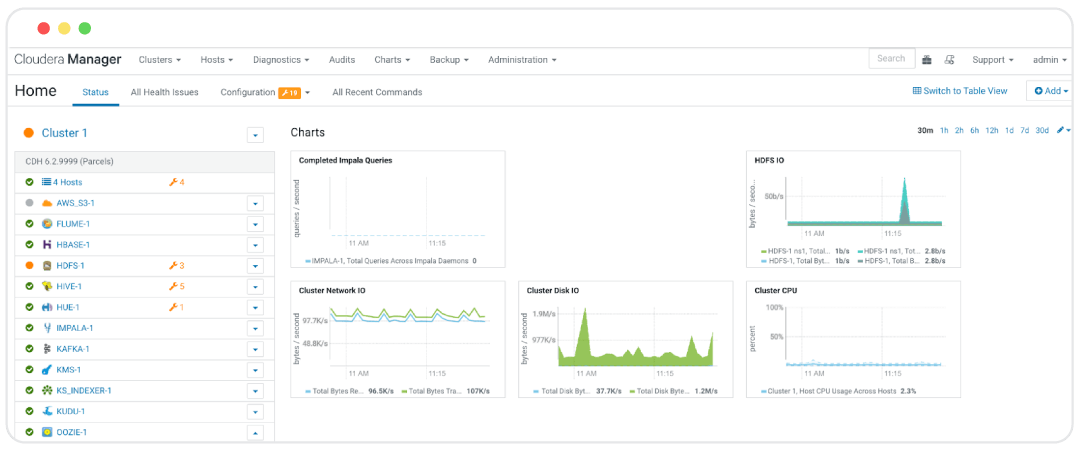
Cloudera Distribution for Hadoop is a completely open-source platform that meets the enterprise's needs. It includes features of the Apache Hadoop software by integrating many open-source framework platforms. It can provide a large set of dataflow in the system.
It provides businesses to perform all sorts of data activities and handles multiple data sources with unlimited data. It delivers a modern architecture for hybrid data solutions.
- Public dataflow
- Queue data handling
- Durable APIs
- Automated pipelines
- Cross-platform implementation
- Easy data administration
- High-end governance/security
- Well-architected distribution
- Complicated charting
- Data security concern
Pricing
- Cloudera is a free tool. The cost per node could be $1000-$2000 per terabyte.
6. Cassandra
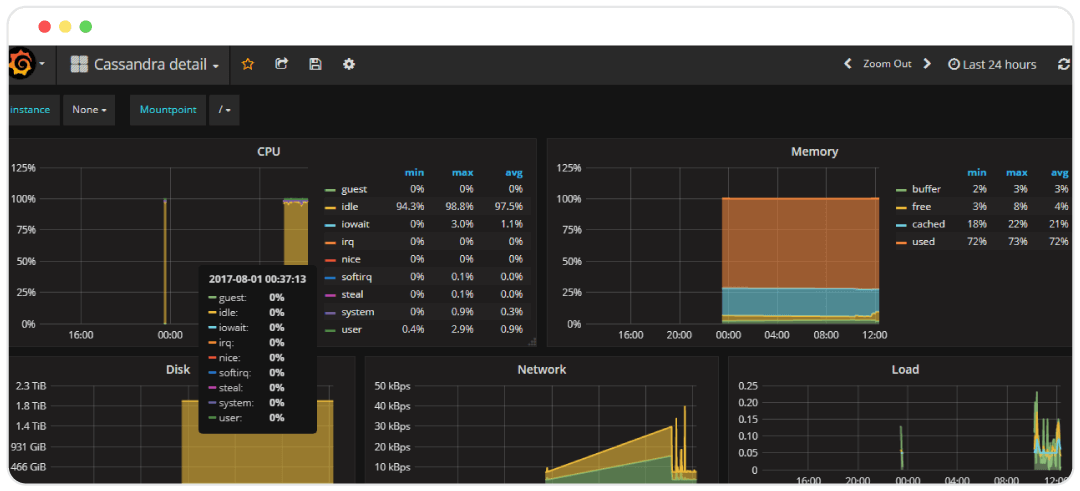
Cassandra never sleeps and can operate a maximum number of data superfast. It is an open-source platform that anyone can use. It is a distributed data network that is reliable to many industries for higher scalability, performance, and providing custom data solutions.
Big tycoons like American Express, GE, Accenture, Yahoo, Facebook, and others use the big data tool. It can secure the data with 100% safety even when the entire data center goes down.
- NoSQL distributed DB
- Multi-data center
- Unparalleled cloud scale
- Scalable and highly available
- Cassandra proxy for client connections
- Masterless architecture
- 100% availability, 0% downtime
- Handles large data sets quickly
- Unlimited data handling/replication
- Ring network topology
- Automated replication process
- No row-level locking
- Conventional maintenance
- Cloud cluster improvement needed
Pricing
-
It is a completely free big data analytics tools under the Apache license.
7. Knime
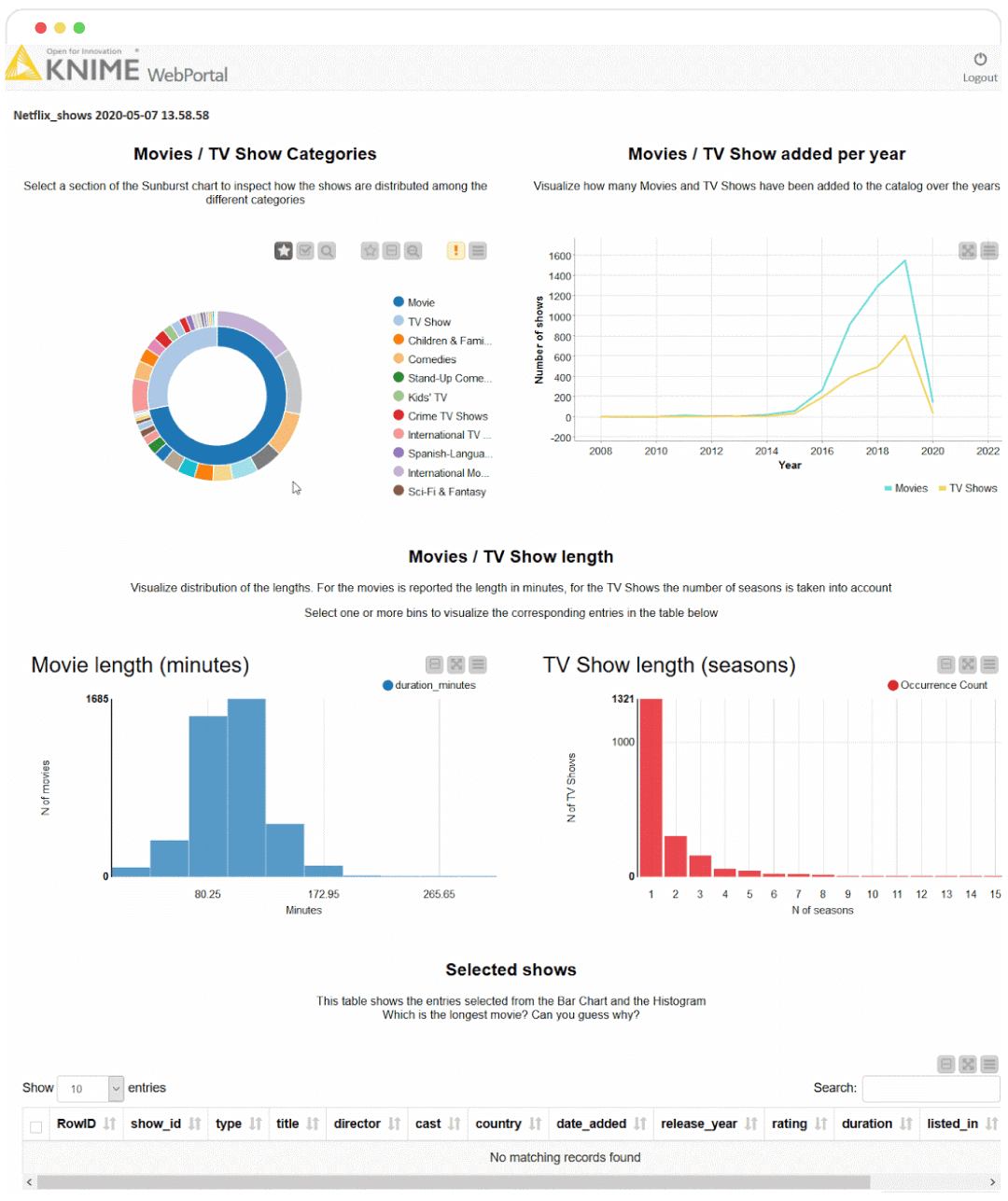
Knime is an open-source big data platform that helps enterprises with data integration, analytics, redundancy, reporting, and data replication services. This platform works smoothly on Windows, Linux, and OS X. Comcast and Johnson & Johnson are some of the top companies using Knime services. It can build a visual API that can analyze a large set of complex data for precise solutions.
Knime delivers end-to-end solutions for greater data scalability in a secured environment. It can be set up easily in any environment. It can finish a lot of work automatically by using AI technology.
- Improved network & data quality
- Scalable solutions
- Efficient production & distribution
- Fast insights for decision-making
- Leverage insights from data
- Integrable with different platforms
- Compatible with other technologies
- Easy setup & integration
- Automated processes
- Greater scalability for large data sets
- Rich algorithms
- High RAM usage
- Improvement needed in data handling
- Integration with statistics graph allowed
Pricing
Knime is an open-source free platform for analyzing most commercial big data products. However, there is pricing for the advanced level of services.
8. DataWrapper
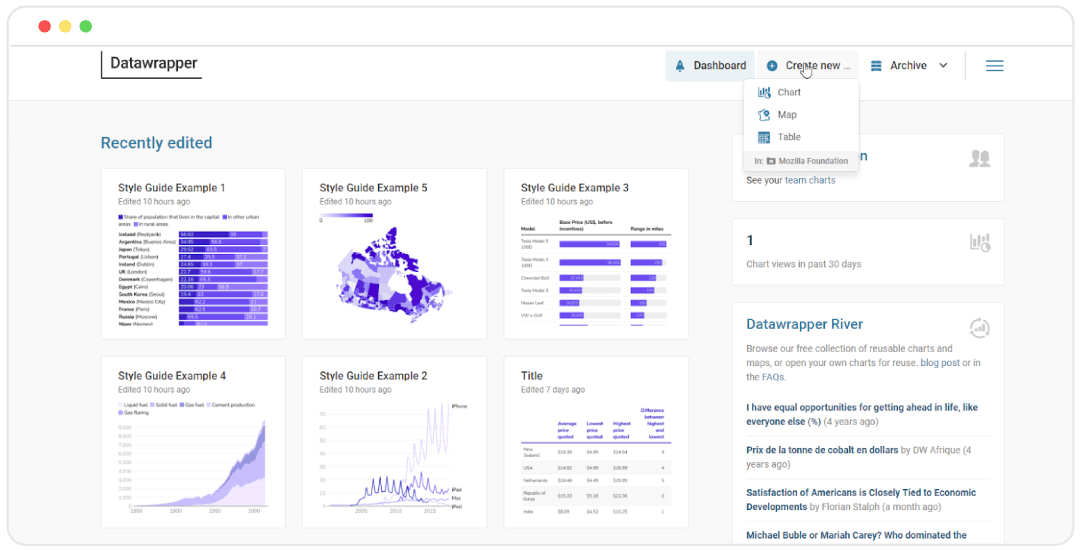
DataWrapper is an open-source free big data analytics tool that delivers data visualization and other data-related services for accurate, precise, embedded charts for better insights. Some of its clients are big names like The Times, Twitter, Bloomberg, and many more.
DataWrapper provides a cloud-based environment on-based, a server approach that easily delivers charts, tables, and graphs to discover insights. It delivers responsive charts and tables that determine delivering a feasible solution. It can be easily deployed in-house, open platform, or content management system.
- Interactive charts with 19 chart types
- Unlimited charts, maps, and tables
- Periodic visualization updates
- Customizable white-labeled chart themes
- Cross-device compatibility
- Fast and secure features
- Exportable data analytics
- Customizable without coding
- User-friendly interface
- Responsive and interactive
-
Color palettes are limited
Pricing
- Free version is available
- Customized and enterprise versions are available
9. MongoDB
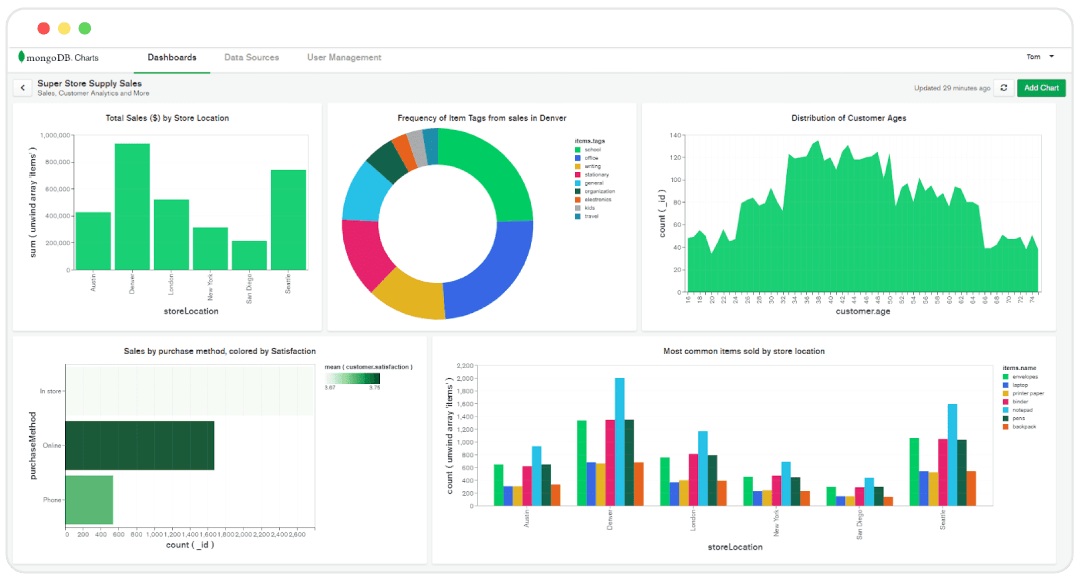
MongoDB is an open-source free big data analytics tool that supports multiple OS like Windows, OS X, Linux, etc., and it is written in C, C++, and Java programming languages. MongoDB is the industry’s top big data tool for enterprises' and start-ups' needs.
Business tycoons like FaceBook, Google, and eBay rely on MongoDB data services. It lowers the computing cost and increases the performance. It performs in-app searches and delivers faster results with an advanced feature called MongoDB atlas search. It is a distributed data delivery multi-cloud-based distributed data warehouse tool that covers more than 95 regions worldwide.
- Simple & expressive query API
- Google Cloud, AWS, and Azure
- Multi-cloud data support system
- Unified query languages
- Serverless and elastic
- Cost-efficient data storage
- Support multiple platforms & technology
- Command lines tools
- Multi-cloud data distribution tool
- featured by MongoDB atlas
- Easy to install and easy to maintain
- Serverless end-to-end encryption
- Data stored in the Atlas
-
Slows down in certain situations
Pricing
- A free trial offer is available
- Paid version of custom/enterprise solutions
Pricing Information of Big Data Platforms
The cost of big data tools varies depending on the platform's nature, quality, and features. Many vendors offer open-source free big data analytics tools with limited features, while others deliver customizable and enterprise versions.
-
Pricing-Based On Industry
Different industries need different solutions. Thus, the nature of the data visualization tool, quality, and storage decides the cost of the big data tool. At the same time, an enterprise solution may seek customized solutions with loads of features.
-
Pricing Suggestions By Vendors
Some vendors offer monthly/bi-annually/annual subscription plans that can be opted from visiting their website and sign-up for a suitable plan.
The average cost a small to mid-scale organization needs to spend is between $10,000 to $1,000,000 annually for data analytics.
Conclusion
You are now aware that ample tools are available for big data exploration, analysis, and database operations. Some big data tools are free, while others offer trial and paid versions. It is essential to analyze your core industry's requirements and look for the right big data tool. Developing a fair sketch of necessary attributes from existing businesses predicts what features and tools a business will require to evaluate and discover better insights.
Anyone uncertain about investing in big data software tools is recommended to use the trial version. It will connect you to existing users' reviews. After satisfaction, you may go for paid versions like customized or enterprise solutions depending upon your business needs.
FAQs
Yes, big data platforms can integrate with other data-related tools and software using various methods, such as APIs, ETL tools, and data warehouses.
3 types of data sources can be analyzed using big data tools and technologies:
- Relational
- Multidimensional (OLAP)
- Dimensionally modeled relational
Centralized architecture is the foundation of the data handling capacity of the traditional platforms, while big data tooling platforms require a distributed network over the cloud server approach.






















